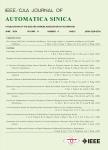A Hybrid Offline-Online Approach to Adaptive Downlink Resource Allocation Over LTE
A Hybrid Offline-Online Approach to Adaptive Downlink Resource Allocation Over LTE作者机构:IEEE the Department of Computer Science and Engineering IIT Guwahati
出 版 物:《IEEE/CAA Journal of Automatica Sinica》 (自动化学报(英文版))
年 卷 期:2019年第6卷第3期
页 面:766-777页
核心收录:
学科分类:0810[工学-信息与通信工程] 1205[管理学-图书情报与档案管理] 12[管理学] 1201[管理学-管理科学与工程(可授管理学、工学学位)] 08[工学] 0802[工学-机械工程] 0811[工学-控制科学与工程] 0812[工学-计算机科学与技术(可授工学、理学学位)]
基 金:partially supported by TATA Consultancy Services(TCS) India through TCS Research Fellowship Program
主 题:Discrete event systems (DES) hybrid scheduling long term evolution (LTE) quality of service (QoS) radio resource management supervisory control
摘 要:Radio resource management mechanisms in current and future wireless networks is expected to face an enormous challenge due to the ever increasing demand for bandwidth and latency sensitive applications on mobile devices. This is because an optimal resource allocation scheme which attempts to multiplex the available bandwidth in order to maximize Quality of service(QoS), will pose an exponential computational burden at eNodeB. In order to minimize such computational overhead, this work proposes a hybrid offline-online resource allocation strategy which effectively allocates all the available resources among flows such that their QoS requirements are satisfied. The flows are firstly classified into priority buckets based on real-time criticality factors. During the offline phase, the scheduler attempts to maintain the system load within a pre-specified safe threshold value by selecting an appropriate number of buckets. This offline selection procedure makes use of supervisory control theory of discrete event systems to synthesize an offline scheduler. Next, we have devised an online resource allocation strategy which runs on top of the offline policy and attempts to minimize the impact of the inherent variability in wireless networks. Simulation results show that the proposed scheduling framework is able to provide satisfactory QoS to all end users in most practical scenarios.



